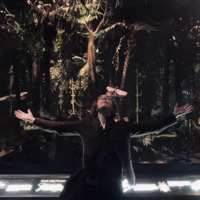James Callahan
Emory University, Philosophy, Graduate Student
- Comparative Philosophy, Marxian critique of Political Economy, Critical Theory, German Idealism, German Romanticism, Ancient Chinese Philosophy, and 18 moreTheodor Adorno, Max Horkheimer, Gillian Rose, Medieval Islamic Philosophy, Medieval Scholasticism, Friedrich Wilhelm Joseph Schelling, Hegel, Karl Marx, Heraclitus, Laozi, Zhuangzi, Confucius, Frantz Fanon, Niccolò Machiavelli, Zera Yacob, Ernst Bloch, Herbert Marcuse, and CLR Jamesedit
A study in three parts of Marx's 1844/Paris Manuscripts, in which I show that 'alienated labor', which Marx derives from problems immanent to political economy itself, forms the basis of Marx's early critique of political economy and... more
A study in three parts of Marx's 1844/Paris Manuscripts, in which I show that 'alienated labor', which Marx derives from problems immanent to political economy itself, forms the basis of Marx's early critique of political economy and generates the requirement for historical materialism.
Research Interests:
Marx's 1844 Manuscripts in Deleuze and Guattari's Anti-Oedipus. A study, in two parts, of Deleuze and Guattari's use of two sources in Anti-Oedipus for their interpolation of Marx's 1844 Manuscripts: Gérard Granel's "L'ontologie marxiste... more
Marx's 1844 Manuscripts in Deleuze and Guattari's Anti-Oedipus. A study, in two parts, of Deleuze and Guattari's use of two sources in Anti-Oedipus for their interpolation of Marx's 1844 Manuscripts: Gérard Granel's "L'ontologie marxiste de 1844 et la question de la 'coupure'" (1968) on the concept of species-being and François Châtelet's "La question de l'athéisme de Marx" (1966) on the concept of atheism.
Research Interests:
Introduction to Aristotle written for a class I taught in Spring 2022. Focuses on his theory of causality and concept of the soul.
Research Interests:
General Introduction to Plato for a 100-level course I taught in early 2022. The goal is an integrated, accessible presentation of Plato's doctrine of truth, theory of the forms, form of the Good, philosopher-kings, theory of education,... more
General Introduction to Plato for a 100-level course I taught in early 2022. The goal is an integrated, accessible presentation of Plato's doctrine of truth, theory of the forms, form of the Good, philosopher-kings, theory of education, immortality of the soul, reincarnation myths.
Research Interests:
Companion to Plato's Timaeus made for an introductory level philosophy course (philosophy of nature/environment) I taught in late 2022.
Research Interests:
First I would like to thank everyone else who had a part in the organization of this conference as well as the other presenters who have gone before me. I would also like to apologize in advance for anyone who came to hear an impassioned... more
First I would like to thank everyone else who had a part in the organization of this conference as well as the other presenters who have gone before me. I would also like to apologize in advance for anyone who came to hear an impassioned polemic about hidden or nascent vitalism lurking behind Kant's account of the organism in the third critique. This current paper was born out of an attempt to find this vitalism, a vitalism that has been suggested by some more recent scholarship on Schelling and the romantic movement more broadly. While I didn't find any vitalism worthy of the name-not in the Metaphysical Foundations, the Critique of Judgment, or even the Opus Postumum-I did find that in Ideas for a Philosophy of Nature Schelling gives what I think is a very good reading of Kant's theory of organism, especially as it pertains to Kant's claim that we have to judge organisms as if they were designed. Schelling, trying to develop Kant's claim that the organism as a natural end is self-organizing, gives us a way to make sense of the order of operations in our recognition of organisms. This paper therefore culminates with a sketch of a hypothetical 'first encounter' between a practically rational agent (one that is capable of imposing organization onto matter) and the organism, at which point the rational agent tries, and fails, to derive the organism from the causality of another rational agent (a demiurge). In the end, this failure will leave us with the merely regulative judgment of the organism as if it was designed, even though we know this, too, ultimately fails to make the organism available to us as self-organizing. The paper ends with a reflection on the possibility of biological science, considering that the analogy to production of a work of art (in the technical sense of 'technique') by a rational agent is both indispensable for our thinking about organisms and, at the same time, incapable of making organisms as self-organizing available to us except through the failure of the analogy itself.
The goal of this study is to understand the systematic unity of Nyāya-Vaiśeṣika ethics, soteriology, ontology, and epistemology. In short, this is an attempt to take Nyāya-Vaiśeṣika seriously as a science of atoms and liberation.
Research Interests:
UPDATED 4/19/24: Now includes an expanded explanation of Confucius' focus on the Zhou Dynasty and its body of ritual practice.
